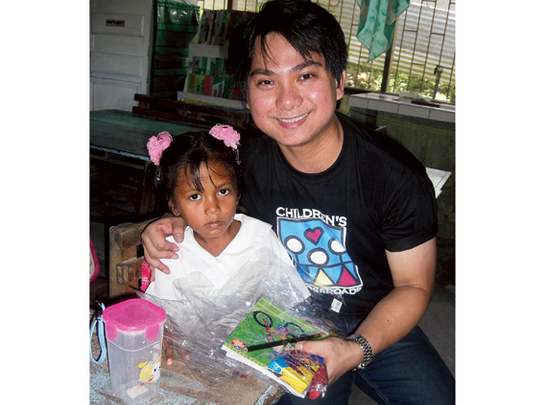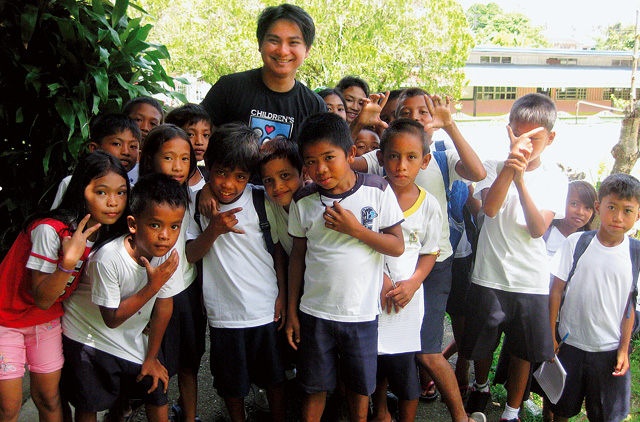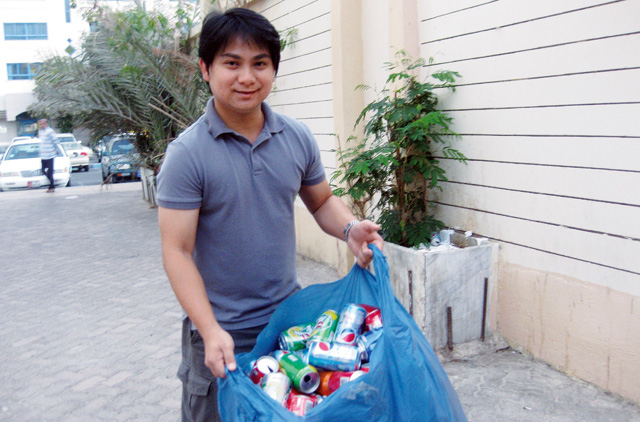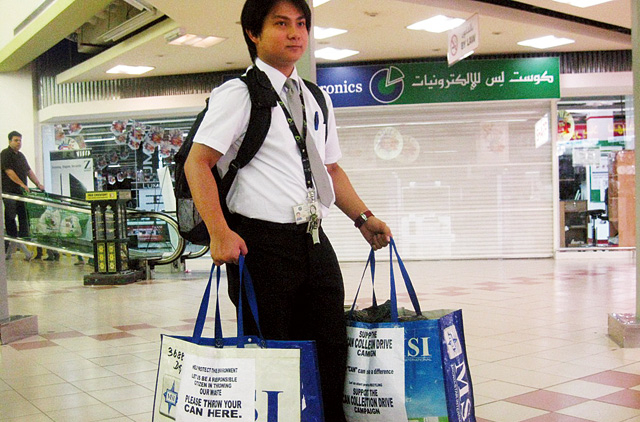
It's Tuesday and Michael Del Moro Manlogon is up extra early on his day off to rush to the food court at the local mall. Two janitors, who are busy cleaning tables, keep an eye out for him. "Yes, we've kept aside the cans for you,'' they say, before handing over a garbage bag brimming with used aluminium soft drink cans. Michael's overjoyed.
On the way to his car, he scans the floor for more cans, stuffing any he finds into the bag. Finally, he goes home with his haul to flatten each can with his feet, then takes the crushed bootie to a city scrap dealer who pays him Dh4 per kilo. Today's haul fetches Dh20 - a sum that makes Michael, 37, smile.
It may not seem a lot for a day's scavenging but it's enough to buy a goodie bag packed with school supplies for a child at school in his home town Perez, in the province of Quezon, in the Philippines. In the past year - even though he has to pick up 100 cans to make a kilo worth Dh4 - he's managed to pay for two 12-year-old children to attend school and send 150 gift bags.
"One of the greatest moments in my life is when I hand over the packet to a child. Seeing the smiles on his or her face makes all my efforts worthwhile," Michael says.
A Filipino expat who works for Abu Dhabi Co-operative Society, Michael first began collecting cans two years ago after watching devastating scenes of Typhoon Ondoy and Typhoon Pepeng destroy large parts of Manila in his home country, killing more than 950 people. "I was deeply troubled to see the destruction in my country," Michael says. "It was while watching images of the typhoons' destruction on TV that I thought that while I cannot stop such things from happening maybe I could do my bit to lessen the impact of waste on the environment. I felt waste had a role to play in climate change that was triggering such natural calamities.''
Michael and his wife Noemi, 31, also a passionate supporter in his charity initiative, wondered what they could do to help.
"Finally in May 2010, I decided I'd collect cans and get them recycled. As my workplace is located near a food court in Mina Center in Abu Dhabi, I used to often see people discarding soft drink cans. I decided to collect them and send them for recycling," he says.
Within a month he'd handed over 74kgs of cans to the Emirates Environmental Group (EEG), a non-governmental organisation based in Dubai that conducts clean-up drives and waste management programmes, and came up with the idea of selling the next batch for scrap.
"I collect around 300 cans a day. It takes me around two hours to flatten them by jumping on them. Some months, particularly during peak summer when people consume a lot of canned drinks, I can make around Dh500 a month."
Michael, who has three children Prince Amir, eight, Princess Kamila, six, and three-year-old Prince Gabriel, then remembered how hard the families from his home town struggled to buy school supplies and decided to help them.
The Perez Central Elementary School is located on an island that can only be reached by boat. Most people there earn their livelihood from fishing and farming. "Many families were finding it difficult to send their children to school because they didn't have enough money to buy supplies for them," he says.
"I wanted to help them in some way to get a good education and when I chanced upon this can collection drive, I realised it had dual benefits - while cleaning up the earth, it was also helping some children in the Philippines go to school.''
On a visit to his hometown, Michael spoke to the school's head teacher who identified around 100 children who were struggling to get school supplies. He also learnt that there were two children who were too poor to afford the fees or books. So he promptly decided to pay for everything they needed - from their fees, school uniform through to all their books. "I realised that meant picking up a lot of cans," he says.
But by the middle of last year Michael had raised close to Dh3,000 - enough to pay for the two children's continuing education and supply enough gift bags for 150 children.
Helping parents, as well as children
Last June, he flew to Perez, to visit the school and personally hand out the supplies. "The children were so happy,'' he says, remembering their smiles and the gratitude of one ten-year-old girl, Trisha, who loved drawing. She couldn't believe her eyes when she opened her pack and a stack of notebooks, pens, pencils, crayons, stickers, and folders fell out.
"I was absolutely surprised to get the box of goodies,'' recalls Trisha, who lives in one of the impoverished neighbourhoods of Perez. "I am so thankful to kuya (big brother, in Tagalog) Michael for his generous gift to us. It was as though Santa Claus had come early. Now my parents don't have to worry about buying notebooks for the whole year."
Teacher Edna Martinez Ursolino is equally grateful. "Such charity projects are very rare in our town, which is why we are very thankful to Michael for giving our children such lovely gifts,'' she says. "Most of my students have financial constraints and this blessing means less monetary burden for their parents for the whole year."
‘Education is a weapon to fight poverty'
Michael is determined to help as many children as possible - even buying slippers for 200 children in his wife's home town Umingan, in the province of Pangasinan.
"They're so impoverished that most children walk barefoot to school as they can't afford shoes," Michael says. "I was quite upset to see the little children walking long distances like that." So he saved up his own money, and along with money his friends gave him, he soon had enough to buy them shoes.
Now he wants to help as many children as possible with his can collecting. "I believe that education is the best weapon to fight poverty and I am happy to empower the future leaders of my nation," he says. "I am not only able to help the environment but also provide educational support to the underprivileged students. In other words, every can that I recycle in the UAE helps in a child's education in the Philippines."
In the future he hopes to drive around with a van displaying a banner that says ‘Recycle for a Cause' and collect cans from more areas of Abu Dhabi. "More cans mean more money and that will mean gift packets - maybe even a computer - for students of Perez next year," he smiles.
Trisha, for one, is sure to be looking forward to meeting Michael this year. If the budding artist is lucky, not only will she get a supply of study material, she may even be able to try her hand at illustrating using a computer.
How can you help?
According to Habiba Al Marashi, chairperson, Emirates Environmental Group, it takes 95 per cent less energy to recycle aluminium cans than to produce aluminium from its raw material bauxite ore. “We need more people like Michael who want to lead a sustainable lifestyle,” says Habiba, praising Michael’s efforts. Michael can be contacted at michael_manlogon@yahoo.com














